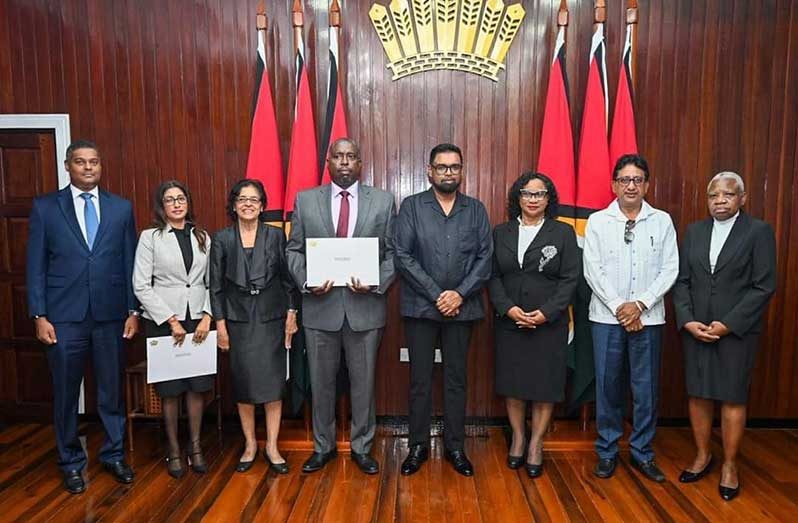–as Law Reform Commission continues work
TO bolster Guyana’s legal architecture, President Dr. Irfaan Ali has said there is an urgent need for legislative frameworks addressing artificial intelligence (AI) and the “futuristic” Silica City project.
He made this call during the swearing-in ceremony for three additional Law Reform Commission members Teni Housty, Clarissa Riehl and Deenawatie Panday at the Office of the President on Tuesday.
The Commission is chaired by Attorney-at-Law Emily Dodson, and includes Everton Singh-Lammy, Dr. Marie Correia, Shuman and others who were already sworn in before.
During his address to the commissioners, President Ali underscored the critical role the commission plays in modernising Guyana’s legal framework, a task that has gained heightened importance with the rapid advancements in technology and the ongoing development of Silica City, Guyana’s first ‘smart city’ project.
President Ali charged the Commission to tackle these emerging challenges head-on, advocating for comprehensive legal frameworks that will protect the nation’s interests in the face of technological and environmental changes.
NEW CHALLENGES, NEW LAWS
As the Law Reform Commission continues its work, President Ali identified AI and the development of Silica City as two key areas requiring immediate legal attention.
He urged the Commission to proactively tackle these issues, stressing the importance of crafting laws that not only regulate but also promote innovation in these fields.
“AI is one such challenge. How are we going to ensure that the body of our laws is protected, our institutions are protected, and we develop a cross-cutting basis through which we can address the challenges of AI and digitisation?” President Ali questioned.
His call for action is rooted in the understanding that as AI technologies evolve, so, too, must the legal frameworks that govern their use, ensuring that they benefit society while safeguarding against potential abuses.
President Ali also emphasised the Commission’s role in supporting the government’s vision for Silica City, a futuristic urban-development project designed to address urbanisation challenges and climate change impacts.
Located along the Soesdyke-Linden Highway, Silica City is poised to become Guyana’s first “smart” city, integrating sustainable living practices with cutting-edge technology.

The Head of State related that Silica City represents a bold step forward in Guyana’s urban development, and its success hinges on the creation of a robust legal framework that can adapt to its innovative design and operational needs.
He urged the Law Reform Commission to examine existing laws and develop a new legislative framework that aligns with the city’s unique characteristics and goals.
“Silica City, it is designed to be innovative, futuristic, modern—a different type of ecosystem, different laws that must cover living in that city,” President Ali said.
He said that the legal infrastructure for Silica City must reflect the city’s commitment to sustainability and environmental stewardship, incorporating specific legislation that supports its modern architecture and the lifestyle it aims to promote.
The President’s vision for Silica City extends beyond merely constructing buildings; it involves creating a self-sustaining urban environment where laws are tailored to meet the demands of a new way of living.
This includes ensuring that the city’s legal framework supports the use of renewable energy, smart technology, and sustainable urban planning practices.
THE COMMISSION’S WORK
The appointments of the current members of the Law Reform Commission, President Ali reaffirms, signals the Peoples’ Progressive Party Civic (PPP/C) government’s commitment to maintaining stability within the Commission.
President Ali stressed that consistency is crucial for the Commission’s effectiveness, warning that frequent changes could disrupt the continuity of its work and jeopardise the progress made so far.
“Reappointing the current members will ensure that the momentum of your work is maintained and will also ensure that the Commission can continue to function with the efficiency and expertise that is expected of it,” he said.
The President praised the Commission’s quiet but steady work, acknowledging the extensive research, consultation, and analysis that goes into crafting laws that meet the needs of a dynamic and evolving society.
In addition to AI and Silica City, President Ali pointed to the upcoming constitutional reform process as another critical area where the Law Reform Commission’s expertise will be invaluable.
President Ali added that the Commission’s term coincides with a period of public consultation and review of Guyana’s Constitution, a process aimed at ensuring that the nation’s supreme law reflects contemporary needs and the will of the people.
“I would expect also members of the Law Reform Commission to be present in some of the consultations, so that you, too, can have an understanding as to what the issues are from the people, and how the changing dynamics are affecting our country’s competitiveness and our ability to be sustainable,” President Ali said.
The President also encouraged the Commission to engage proactively with the private sector to identify areas where legal reforms could enhance business competitiveness and sustainability.
This collaborative approach, he explained, is essential for building a modern legal architecture that supports economic growth and national development.
“The experience you’ve gained in your first tenure on the Law Reform Commission will undoubtedly serve you well as we embark on this succeeding term,” President Ali said, expressing his confidence in the Commission’s ability to meet the challenges ahead with the same diligence and dedication that have characterised its work to date.





.jpg)








